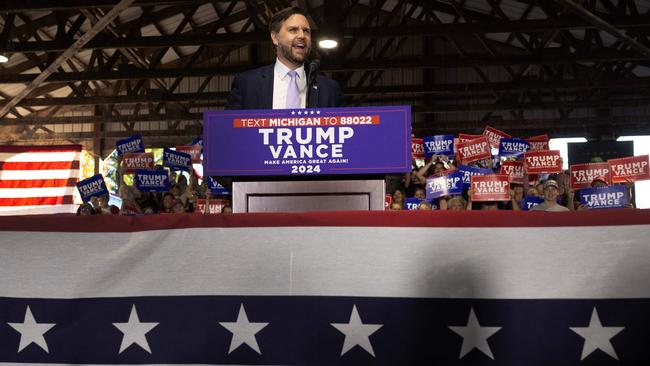JD Vance and the ‘new right’ spark Washington policy war
Donald Trump’s vice presidential nominee has become the unexpected figurehead of a new conservative movement calling itself the ‘New Right,’ that seeks to rewrite Republican policy.

A decade ago, when Republicans were consumed by cutting spending and repealing Obamacare, JD Vance was a 29-year-old conservative law clerk in Cincinnati who thought they were doing it all wrong.
He sent unsolicited emails to right-leaning editors telling them they needed to focus more on the people in rural America whom globalisation had left behind. He started taking an interest in Catholicism when the party was dominated by evangelicals. At one point, he even pushed his way into an invite-only conference in Middleburg, Virginia, according to people who attended, in which conservative intellectuals were trying to rethink the Ronald Reagan-era, limited-government approach that had dominated the Republican Party for decades.
Now Vance, who is preparing to take the stage at the debate against Democratic vice-presidential nominee Tim Walz on Tuesday, has emerged as one of the staunchest defenders and attack dogs for former President Donald Trump, the Republican presidential nominee. In Washington, he has become the unexpected figurehead of a new conservative movement that draws on his early fixation with policy to rewrite Republican orthodoxy with a philosophy that champions industrial policy, questions Wall Street and embraces trade protectionism.
While “Project 2025” has garnered attention for its radical prescriptions for a second Trump term, it has overshadowed a high-stakes debate between old-guard conservatives and the pro-Trump policy movement that calls itself the “New Right.”

As the movement has risen to prominence, its acolytes have helped rally Republicans to support some surprising causes including using U.S. government money to redirect the private sector, like a $280 billion law in 2022 to boost the U.S. semiconductor industry. They have moved the idea of expanding the child tax credit from the Republican fringes to a hotly debated issue in the presidential election. And they have at times expressed admiration for Federal Trade Commission Chair Lina Khan, whose crackdown on corporate consolidation has led business executives to push for her ouster.
Old-guard conservatives, from billionaire Charles Koch to antitax activist Grover Norquist, are working to hold together the Tea Party-era Republican coalition that remains a potent force in Washington despite Trump’s rise.
Hundreds of their activists and allies gathered at the Watergate Hotel recently for a gala hosted by the largest Koch-backed advocacy group, Americans for Prosperity, where a string quartet played during cocktail hour and guests snagged cigars as party favours. The group’s chief executive, Emily Seidel, told the crowd they would work against “the insurgence of big government policies on both the left and the right.” ” Thomas Jefferson once warned, ‘the natural progress for things is for liberty to yield and government to gain ground,’” Seidel said during her speech, adding: “Our message is clear: Not on our watch.” The crowd erupted in applause.
Vance’s allies say the old guard has already lost – the establishment has larger numbers and deeper pockets, but momentum is on the New Right’s side.
“The pre-Trump political alignment in this country is just gone,” said Oren Cass, a longtime friend of Vance’s who founded a think tank in 2020 called American Compass that has become the most influential New Right group on Capitol Hill. “It’s not coming back.” Courting the next generation Over a steak salad at Hawk ‘n’ Dove, a pub a few blocks from the Capitol that became a GOP favourite after it refused to follow lockdown orders during the early days of the Covid-19 pandemic, Cass said his goal was to recruit the next generation of conservatives to his side.

A mild-mannered former Bain & Co. consultant and Mitt Romney policy adviser who lives in leafy western Massachusetts, Cass doesn’t share much in common on the surface with Trump – but their interest in conservative populism has placed the two on the same side of an ideological war.
Cass and his allies have gained a reputation for channelling Trump-era populism into Republican policy proposals, making him popular with a handful of senators including Sens. Marco Rubio (R., Fla.) and Todd Young (R., Ind.), in addition to Vance, who represents Ohio in the Senate. Cass’s American Compass helped fill a void in the conservative ecosystem, Rubio said, which some Republicans long worried had become dominated by stale ideas.
Vance briefly dabbled with becoming a professional policy guy. When he wrote the first draft of his best-selling memoir, he focused on how government policies could help those who had been left behind in rural America, according to people Vance spoke to about his book. Instead, his editor convinced him to turn it into a narrative focused on his hardscrabble upbringing.
Catholics and IVF American Compass’s biggest effort to recruit younger conservatives takes place behind closed doors: An off-the-record, invite-only membership group of around 200 20- and 30-somethings who work in politics, law and business and have access to a weekly rotation of salon dinners, seminars, happy hours and an annual retreat at a Hyatt on Maryland’s Eastern Shore.
Many events are designed to include families and children, an effort by the group to promote family life, which often has deeply religious underpinnings. While Cass is Jewish, the movement has attracted a number of devout Catholics, and converting to Catholicism, like Vance did, is popular with members. (One Washington conservative joked that, upon hearing that another friend had converted, his reaction was simply: “We lost another one.”)
Members often debate what the New Right’s policy approach should be. Last spring on the Eastern Shore, a breakout group at the annual retreat largely agreed they wanted to make fertility treatments, a hot topic in conservative circles, needed less often by easing the economic burdens on young people so they could start families younger, according to one participant. But the group was divided over what the solution should be in the meantime: better to ban IVF altogether, or allow it to exist as a patch until the country can convince couples to stop delaying childbirth?

Moderate Washington Republicans snicker about the New Right being faddish and overly focused on increasing birthrates. Old-school conservatives like Norquist have used American Compass’s funders – including the Hewlett Foundation, which largely gives to left-leaning causes – and Cass’s unorthodox ideas, like raising the corporate tax rate, as ammunition to accuse him of being a Republican-in-name-only.
One recent morning, around 75 aides were shuffling into a Capitol Hill meeting room for a briefing from an American Compass aide when they were unexpectedly confronted by emissaries from the Republican old guard: Two aides from Norquist’s group were standing in the hallway doling out flyers titled, “Who Said It, Oren or Warren?” referring to liberal Massachusetts Sen. Elizabeth Warren. For example: “Have tax cuts been working? No.” Asked about the flyers, Norquist said it was just “some of the interns having fun.” Cass’s influence, Norquist argued, has been exaggerated: “The only time I spend [on him] is talking to reporters.” Tax-code pushback Free-market conservatives still dominate much of Capitol Hill. This month a former aide to Sen. Cynthia Lummis (R., Wyo.) strode into the senator’s office to talk taxes, wearing a cowboy hat and a tie with the Koch-backed group Americans for Prosperity’s logo printed on it.
Lummis didn’t support a bipartisan tax plan earlier this year that American Compass backed. It would have used the tax code as a “social service program,” she told the aide-turned-Americans for Prosperity employee after greeting him warmly.
While the New Right has momentum, its future – and whether it will be dominated by Vance, or someone else – is still in flux.
A Trump loss in November could unleash a renewed campaign by establishment Republicans to wrest back control of the party, potentially scuttling Vance and Cass’s political future.
If Trump wins, many of the stars of the New Right movement could find themselves newly empowered. In addition to Vance, New Right-aligned lawmakers such as Sen. Josh Hawley (R., Mo.) and Tom Cotton (R., Ark.) are seen as possible contenders for senior jobs in a second Trump administration.
Yet Trump remains an unpredictable figure with few closely held beliefs. How he would govern, and whether policy issues would take a back seat to the political crises and palace intrigue that dominated Trump’s first term, is uncertain.
Whatever happens in November, change is afoot, Sen. Lummis said after the meeting. “I think there is a subtle transition going on between the more-establishment Republicans and whatever you wanted to call it – the ‘New Right’?”
The Wall St Journal





To join the conversation, please log in. Don't have an account? Register
Join the conversation, you are commenting as Logout